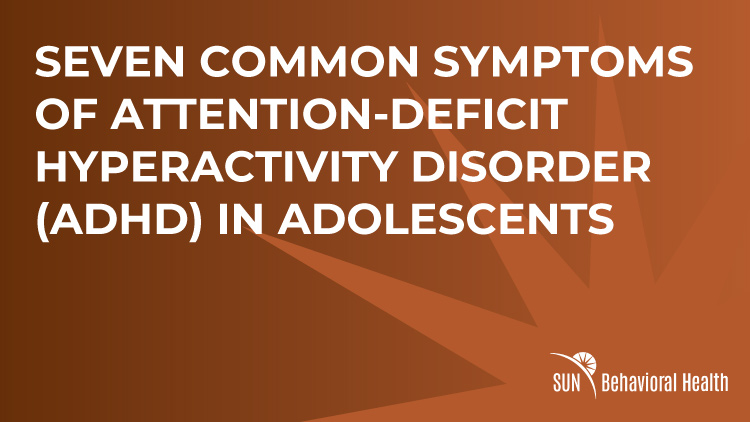Services
- Home
- Mental Health Services
- Who We Treat
- How We Treat
- Patients & Visitors
- About
close

We know that watching your child struggle is always hard. You want them to be as successful as they can be in everything they do. If you’ve noticed your child has a hard time focusing, you might be concerned that they could have attention-deficit hyperactivity disorder or ADHD. A teacher or someone else at your child’s school might have reached out to you about behavioral issues, or maybe you’ve noticed that your child struggles with paying attention.
It is important to know that this can be just as frustrating for your child as it is for you. Children struggling with ADHD are often accused of slacking off or not caring about their work. If your child is suffering from ADHD, even when they want to be able to focus, they often struggle due to factors outside of their control. While ADHD is usually discussed in terms of the way it impacts a child’s school performance, it can also affect other parts of their life, like their social and emotional well-being.
If your child is suffering from ADHD, they are not alone. In fact, it is increasingly common among children in the U.S. According to the Centers for Disease Control and Prevention, 9.4% of children in Texas had been diagnosed with ADHD as of 2011.
ADHD can be difficult to diagnose. There are many subtypes of ADHD, and there is no single definitive test for ADHD. Girls and boys often have different symptoms. It is also sometimes mistaken for other behavioral health conditions, like bipolar disorder, autism, or even a sleep disorder. There studies that point to several different causes of ADHD as well.
If you are concerned that your child may have ADHD, doing research like this is the right first step. We know you want what’s best for your child, and that’s what we want, too. To help you get an idea of what ADHD may look like in your child, we have compiled a list of seven of the most common symptoms of ADHD.
People with ADHD usually pay very little attention to detail. This often shows up in their schoolwork when they make small mistakes that seem like they would be easy to fix. This might look like making simple mistakes on a math test and ending up with the wrong answer because they didn’t finish reading the instructions, or getting points deducted on an essay. After all, even though they wrote a good essay, they were careless with grammar, spelling, and punctuation.
This could also show up in other areas of their life. They may struggle to remember dates or not notice minor changes around the house. A child suffering from ADHD might do chores incorrectly or miss a small piece of information when you tell them to do things. People with ADHD tend to be more concerned with the big picture and ideas but struggle to figure out the details that make up that bigger picture.
If your child has always been really chatty, they might have ADHD. However, just being social is probably not a sign of ADHD. This kind of talkativeness tends to be nonstop. It may seem almost like your child narrates a stream of consciousness, saying every thought that comes into their head out loud.
Sometimes being highly talkative can help people with ADHD make friends. However, this level of talkativeness often causes trouble in school and social settings. Their friends or acquaintances may feel like they can’t get a word in as the person with ADHD is always dominating the conversation. In many cases, your child may not even be aware that they are talking over their friends.
In school, your child may have trouble being quiet when they shouldn’t be talking. It may be difficult for them to sit quietly through lessons or other activities. Teachers may scold them for talking during class or distracting other students by trying to strike up a conversation during a lesson.
Teens with ADHD are often described as being highly active. They often have trouble sitting still for any period of time and want to constantly be on the go. For many parents, this has been noticeable from an early age and may have been overwhelming to try to keep up with when the child was younger. Now, people may even express envy for their seemingly endless energy.
When people with ADHD finally do settle and sit down, they often cannot sit still. They may play with their hands, play with their hair, or tap their feet nonstop. In the last few years, fidget toys, or small hand-held toys, have been used by people with and without ADHD to try to focus their energy when they are sitting and trying to complete a task.
Teachers may note that your child has a lot of trouble sitting at their desk for an entire class period, or that they do things the teacher considers distracting, like doodling or playing with items at their desk.

Many people with ADHD put off starting tasks that require focus or mental energy. You may feel that your child does everything at the last possible minute. This may show up in many areas of their life, from the moment they wake up with five minutes to get out the door to the moment they go to sleep three hours later than they were supposed to.
Your child may get ideas of things they really want to do but never actually start the process. This may be things like learning to draw or starting a club at school. This is likely frustrating to you, but it is also usually very frustrating for your child as these are things they want to do but feel like they can’t.
Teachers may notice this symptom in the form of unfinished or late assignments. They may also notice that your child doesn’t start things on time even when they are given time in class to work on a project.
Even once a person with ADHD has finally started a task, they may struggle to complete it. You may feel like you have spent hundreds of dollars starting them in lessons for everything from piano to karate only for them to get bored and quit after a few months and move on to the next thing. They might struggle to do things like finish a book even if they were really interested in it, or have half-finished drawings they swear they’ll go back to.
This is another symptom that may be exceptionally noticeable in the classroom. Assignments may get turned in late or be incomplete. You may feel like every week you have to stay up and watch your child to make sure they finish the assignment that’s due in the morning that they forgot to tell you about until the night before.
This symptom can seem like the opposite of a lot of the other symptoms that we’ve talked about and is often a reason that people do not realize they have ADHD. People with ADHD can become extremely focused on things they find interesting, which is often referred to as hyperfixations. For example, it may feel like you have to pull teeth to get your child to focus for half an hour on their math homework, but they can become totally engrossed in a video game for hours on end without doing anything else. These hyperfixations can be an activity or topic or really anything the child finds interesting.
However, this is usually not a normal level of interest. This is probably something your child pours hours of time into, talks about all the time, and it may even seem like they can’t think about anything else. Quite often, this hyperfixation only lasts for a few weeks at a time before the person moves on to something else.
People suffering from ADHD often have a lot of trouble thinking things through. Often this shows up as wanting to get from point A to point B but not being able to think clearly about the steps required to get there. For example, your child may want to finish their homework but struggles to break down how many smaller tasks (completing sections of the assignment) it will require and gets overwhelmed trying to do it all at once.
This may also make it seem like they cannot understand the consequences of their actions. They may struggle to think about how the things they do will affect themselves or other people in the future and instead only think about what is happening at the moment.
At SUN Behavioral Houston, we have excellent treatment services for ADHD. We have a program specifically geared for adolescents who have ADHD. Here at SUN, we believe in a family education approach. This means that we don’t just help the teen manage their symptoms, but we also help parents with behavioral training so they can help support their teen.
Medication is also a common approach for ADHD treatment. Common ADHD medications include Adderall®, Ritalin®, Vyvanse®, and Concerta®, all forms of dexmethylphenidate, dextroamphetamine, lisdexamfetamine, or methylphenidate. Medication is not always appropriate, and sometimes one medication works better than another for individual patients. Because of this, we start patients on the lowest dose of medication, which may be increased over time.
At SUN Behavioral Houston, we work to serve unmet needs in our community. If you believe your child may be suffering from ADHD and would benefit from our teen ADHD treatment program, reach out to us at (713) 796-2273. Get your child the treatment they need to succeed today.
How can you tell if someone has ADHD?
ADHD symptoms vary from person to person. They can also vary depending on what subtype of ADHD a person has. There is no single test for ADHD. However, if someone shows many of the above-listed symptoms, they may have ADHD. It is important to get an accurate diagnosis from a medical professional.
What are three symptoms of ADHD?
Three common symptoms of ADHD include:
What can ADHD be mistaken for?
ADHD is commonly mistaken for many things, including:
What are five signs and symptoms of ADHD or ADD?
Five signs that someone has ADHD include: